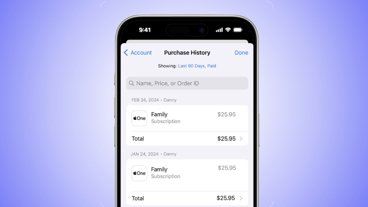Last-minute iPod rumors reaffirm cameras for touch, nano
Calling them "sure thing bets," the Daring Fireball blogger said that both the iPod nano and iPod touch will receive cameras. He believes the new iPod touch will have the same RAM and processor speed as the iPhone 3GS, and the new media player will sell in capacities of 16GB, 32GB and 64GB at prices of $199, $299 and $399, respectively. He also said that the hard drive-based iPod classic will remain, likely with a 160GB capacity for $249.
Gruber admitted that he has heard "very little" prior to Wednesday's event in San Francisco, reaffirming reports that a veil of secrecy returned when co-founder Steve Jobs returned to work at Apple. And all of what he's confirmed, including the addition of cameras to the iPod touch and iPod nano, was known months ago.
Beyond the information Gruber is confident with, he also offers a number of unverified rumors and personal speculation. Among them:
- Rumors that the new iPod nano will have a "top-secret new material/treatment" on its exterior, and will include an FM tuner.
- A prediction that the iPod shuffle will be redesigned once again, as Gruber believes the no-button model has been a flop.
- Because iTunes is run on both Windows and Mac, and most iTunes users are on Windows, it would not make much sense for Apple to write iTunes 9 in Cocoa for 64-bit (it is currently a 32-bit Carbon application). Instead, Gruber predicts that iTunes will be rewritten using WebKit, the same browser engine used in Safari, to allow the application to be developed simultaneously for both Windows and Mac.
- Rumors of Apple's "Cocktail" offering, designed to incentivize sales of full albums, have existed for months. Gruber believes that this, too, will be rendered in WebKit. "My guess is that Cocktail is going to be like a sort of next-generation Dashboard."
- While analysts have engaged in a will he or won't he debate on whether Jobs will appear Wednesday, Gruber does not believe he'll be on stage.
Apple's keynote is scheduled for 10 a.m. Pacific, 1 p.m. Eastern on Wednesday. AppleInsider will have full coverage and analysis of the event.
 Sam Oliver
Sam Oliver













 Amber Neely
Amber Neely
 Thomas Sibilly
Thomas Sibilly
 AppleInsider Staff
AppleInsider Staff
 William Gallagher
William Gallagher
 Malcolm Owen
Malcolm Owen
 Christine McKee
Christine McKee










69 Comments
I think it is supposed be at 1 pm eastern, otherwise i'll stay up
Well a 3.5to 5 mega pixel anything pod like is fine
and a MIFI ipod of any stripe is also fine
and a ipod with a beatle logo on the outside and filled with the whole beatle collection on the inside would fine too >>>>>>>>>>
When I get to the bottom I go back to the top of the slide
Where I stop and I turn and I go for a ride
Till I get to the bottom and I see you again.
Do you, don't you want me to love you.
I'm coming down fast but I'm miles above you.
Tell me tell me tell me come on tell me the answer.
I wonder if the cameras in both iPod Touch and Nano will be video capable.
One would think so for the Touch...but the Nano's display may be just too small.
I think it is supposed be at 1 pm eastern, otherwise i'll stay up
Yep.. 1PM out our way... means I can sleep in and still not miss... whatever it is they plan on underwhelming** us with tomorrow.. Fact is, nearly every Apple event leaves more than a fair share of us jaded and battlescsarred veterans are left typing: "Ummm okay, Steve actually held a special EVENT for THAT?!!"
**BTW dibs on being the first to claim the event as totally underwhelming!
Dave
Because iTunes is run on both Windows and Mac, and most iTunes users are on Windows, it would not make much sense for Apple to write iTunes 9 in Cocoa for 64-bit (it is currently a 32-bit Carbon application). Instead, Gruber predicts that iTunes will be rewritten using WebKit, the same browser engine used in Safari, to allow the application to be developed simultaneously for both Windows and Mac.
I highly doubt that iTunes 9 will be rewritten using Webkit. It simply doesn't make any sense. Webkit is a web rendering engine and writing iTunes using Webkit would essentially make it a "Web App" that uses javascript, html and css.
Windows users are already complaining how iTunes is slow and bloated on Windows, javascript simply wouldn't cut it to manage 10,000+ songs in a library.
Safari wasn't ported to Windows using Webkit. It was Webkit itself that was ported to Windows, along with Core Graphics and Core Foundation, with some of the Cocoa API's, to enable Apple to easily port Safari using pretty much the same code-base as the Mac OS X version.
Anyone remembers "Yellow Box for Windows" from the Rhapsody days?
Apple could indeed use the same method used with Safari to port a Cocoa version of iTunes.